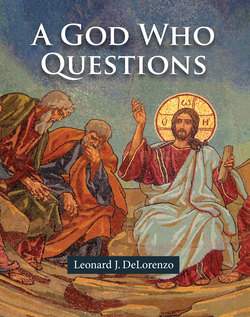Читать книгу A God Who Questions - Leonard J. DeLorenzo - Страница 12
На сайте Литреса книга снята с продажи.
ОглавлениеChapter 4
Do you see anything?
And they came to Bethsaida. And some people brought to him a blind man, and begged him to touch him. And he took the blind man by the hand, and led him out of the village; and when he had spit on his eyes and laid his hands upon him, he asked him, “Do you see anything?” And he looked up and said, “I see men; but they look like trees, walking.” Then again he laid his hands upon his eyes; and he looked intently and was restored, and saw everything clearly.
And he sent him away to his home, saying,
“Do not even enter the village.”
— Mark 8:22–26
Right before this peculiar miracle of Jesus healing the man in stages, Jesus chides his disciples for having eyes but not seeing, and having ears but not hearing (cf. Mk 8:18). They have followed, watched, and heard him, but they see and hear only obscurely, not yet trusting him with all their heart, not yet hoping in him beyond expectation, not yet loving him completely. “Do you not yet understand?” (Mk 8:21) is the last thing he says before they witness this peculiar miracle.
In and through his spittle and with his own hands, Jesus works on the blind man. He touches the man’s sick eyes directly, and the cure sets in. Watching this, the disciples see the power of Jesus’ body, perceiving how his touch brings about healing. But they do not see the healing happen all at once; they see it occur in stages. And so by watching this gradual miracle, the disciples gaze upon a mirror of themselves: seeing, but not clearly, hearing, but not well.
Right afterward, Peter sees what he did not see before — “You are the Christ” (Mk 8:29) — but he immediately reveals just how blurry his vision still is. “And Peter took him, and began to rebuke him” (Mk 8:32). He has seen, but he still does not really see; he has heard but has not listened — not with all his heart, all his mind, all his strength. He and the other disciples are being cured, in stages, to the extent that they are able, or, rather, willing.
For those of us who have become blind and deaf to the Messiah who suffers in the flesh for us, moving out of our old ways, customs and preconceived notions is never immediate. We are healed in stages. We must first be separated from what we have clung to; then, we must learn what is true; and then, we shall come to delight in this new gift. In the mystical tradition, these are called the stages of ascent: purgation, illumination, and perfection. Ultimately, this is how we grow accustomed to Jesus’ touch, for the power of God is communicated to us in and through his body.
We resist that power because it changes us, and change is difficult, just like being healed is often difficult and tiring. But once the cure has set in, we start to see something new, and hope grows. The path to fullness of health opens wider, and yet it requires more change, and that can also be daunting.
It is tempting to turn back, as Peter did, to the old ways. Jesus knows this, which is why I think he commands that once-blind man: “Do not even enter the village” (Mk 8:26). The disciples hear this, too. They know something of their own bad habits: the things they watch, the things they hear, and the things they do that make them sick, leaving them blind and deaf and unreceptive to this new gift in Jesus, whom they trust and follow and love, but not yet all the way. So Jesus tells them to stay away from what made them sick in the first place. He tells them to cling to him instead.
It turns out that being healed of blindness is not a one-time thing — at least not the deep healing that only Jesus can do. The ability to see clearly is a gift, and it demands discipline in order to continue seeing aright. We have a remarkable capacity to blind ourselves, running toward those things that ail us. The deepest healing here does not stop with the eyes, but reaches all the way to the deepest part of the will. Just like the blind man, the disciples themselves must not only feel Jesus’ touch, but also heed his words. For their own good he tells them, “Do not even enter the village,” but stay close to me and all will be well.
Prayer Divine Healer,don’t let go of me.Keep me close to you.Heal me.
